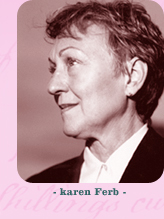| |
|
 My father always liked to tell us how his
grandfather— who had eight children and uncounted grandchildren—
would greet him, “By God, Son, which one are you?” He also
liked to relate how his grandfather always ate dinner at the head
of the table, served by his wife, while everyone else stood by and
waited in silence until he was finished. One day, I’m told, he
drank from a bottle of shoe polish while the dismayed entourage looked
on speechless, afraid of arousing the ire of the patriarch yet fearing
he’d take sick and die. “What about your grandmother?”
we’d always ask. “Did she love you? Was she nice to you?”
Dad said he really didn’t know, she never said much of anything.
We grew up with the idea of an oppressive tyrant waited on hand and
foot by his long-suffering slave of a wife. Not a pretty picture.
My father always liked to tell us how his
grandfather— who had eight children and uncounted grandchildren—
would greet him, “By God, Son, which one are you?” He also
liked to relate how his grandfather always ate dinner at the head
of the table, served by his wife, while everyone else stood by and
waited in silence until he was finished. One day, I’m told, he
drank from a bottle of shoe polish while the dismayed entourage looked
on speechless, afraid of arousing the ire of the patriarch yet fearing
he’d take sick and die. “What about your grandmother?”
we’d always ask. “Did she love you? Was she nice to you?”
Dad said he really didn’t know, she never said much of anything.
We grew up with the idea of an oppressive tyrant waited on hand and
foot by his long-suffering slave of a wife. Not a pretty picture.
Recently, I received information from an
uncle and an aunt, both years older than my father, which drastically
changed my ideas about these forebears. His mother brought my great-grandfather
to this country at the age of nine, along with three sisters. She
was escaping a vile marriage to the town drunk. Great grandfather
grew up and founded a factory. He married a woman whose parents had
emigrated from a town just a few miles away from his. She had been
deaf since the age of seven, so it is not surprising that she didn’t
say much-- she didn’t hear anything! When I told my father, he
was shocked; no one had ever told him. And [no one] ever told me that
the oh-so tyrannical man was greatly respected in his adopted city
for his service in the Civil War and his patriotism in World War I.
He was revered for keeping his factory open and, at great personal
expense, continuing to pay his workers during the Great Depression.
| You
can see how it goes in families, how we share a gene pool and
a common history, but run afoul of each other when we do not
share a common experience or memory of people, places, and things. |
Other things we do or do not pass on to
our children, intentionally, or not, can be subtler, more damaging.
A break in the chain of memory (death, divorce, abandonment) can
be so devastating that its effect ripples across generations. Misunderstandings
can cause family members to line up on battlefields like soldiers
in opposing camps. Unintentional slights can assume a froth of gigantic
proportions, like an unstirred sauce at a fierce boil. Remember
when you told me about “Rosebud?” You thought it was your
other grandfather’s special name for you until you heard him
call your little cousin by the same name. You confessed you never
felt the same affection for him after that. I wish you had spoken
up right away, because it was too late to remedy by the time you
did. But you were too young and did not know.
The rift in the chain of memory caused by early deaths in our family
has cost you dearly, as it has cost me. I came to this realization
rather late, too late to remedy; but like you, I was too young and
did not know how. As old as they were, none of your grandparents
were old enough. I was angry with them for a long time, though I
tried all the while to act as if nothing were [or] ever had been
amiss. That had always been the clear expectation on both sides
of our family- if you do not talk about it, it never happened. Then
one day, out of the blue, I heard magical words. They came from
my father through your father. Very simply, he said, “I was
a bad grandfather, wasn’t I?” There’s really no way
to answer that, and I doubt an answer was expected. But in that
moment he achieved redemption in my heart because I knew he never
meant to bad; he just didn’t know how to be good.
My Dear, you too will be happier if you can forgive. Trust that
no one meant to hurt you. Accept the broken links that can never
be repaired. See to it that the links going forward stay strong,
insofar as it is within your power to do so, because you have only
one family
 |
|
|
